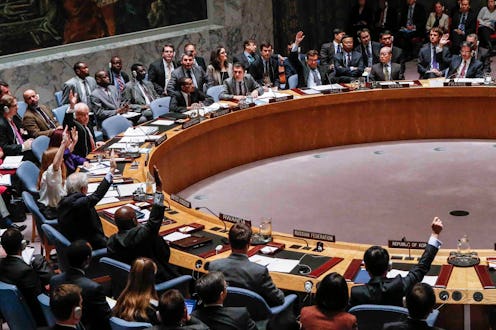News
Here Are All The Countries That Haven't Quit The U.N. Human Rights Council

Unpredictable government actions that would have once stunned a nation are almost par for the course in 2018. On Tuesday, the Trump administration withdrew from the U.N. Human Rights Council to protest both what it believes is prejudice against the United States' long-time ally Israel and the inclusion of member nations that are notorious human rights abusers, according to CNN. It's an action that leaves many wondering just who is in the U.N. Human Rights Council.
The withdrawal comes a day after the U.N. human rights chief called the Trump administration's policy of separating children from their parents at the U.S.-Mexico border "unconscionable." Zeid Ra’ad al-Hussein had likened the practice to child abuse and said the experience could lead to "irreparable harm with lifelong consequences," according to the New York Times.
There are a total of 47 members states in the council, according to its website, and as of Tuesday afternoon, the United States was still listed as a member. Each nation has an expiration date on its membership, with the United States' term originally due to expire in 2019. The other current members listed on the Human Rights Council's website are: Afghanistan, Angola, Australia, Belgium, Brazil, Burundi, Chile, China, Côte d’Ivoire, Croatia, Cuba, Democratic Republic of the Congo, Ecuador, Egypt, Ethiopia, Georgia, Germany, Hungary, Iraq, Japan, Kenya, Kyrgyzstan, Mexico, Mongolia, Nepal, Nigeria, Pakistan, Panama, Peru, Philippines, Qatar, Republic of Korea, Rwanda, Saudi Arabia, Senegal, Slovakia, Slovenia, South Africa, Spain, Switzerland, Togo, Tunisia, Ukraine, United Arab Emirates, United Kingdom of Great Britain and Northern Ireland, and Venezuela (Bolivarian Republic of).
"Human rights abusers continue to serve on, and be elected to, the council," said U.N. Ambassador Nikki Haley, according to CNN. "The world's most inhumane regimes continue to escape its scrutiny, and the council continues politicizing scapegoating of countries with positive human rights records in an attempt to distract from the abusers in its ranks."
Some though, like the president of Mexico, saw the withdrawal as a hypocritical move.
Other human rights groups disapproved of the move and the loss of influence within the council.
"When a so-called Human Rights Council cannot bring itself to address the massive abuses in Venezuela and Iran, and it welcomes the Democratic Republic of Congo as a new member, the council ceases to be worthy of its name," said Haley, according to ABC News. "Such a council, in fact, damages the cause of human rights."
At least 993 documented executions were recorded in 2017, according to a 2017 report by Amnesty International. A majority of those executions happened in China, Iran, Saudi Arabia, Iraq, and Pakistan, in that order, with China acting as the most frequent executioner in the world. Iran, however, is not a member of the Human Rights Council, and it's unclear why Haley mentioned it, though the rest of the nations listed as the top executioners by Amnesty International did all gain admission to the current council.
“I want to make it crystal clear that this step is not a retreat from our human rights commitments,” Haley said, appearing with Secretary of State Mike Pompeo at the department, according to The Washington Post. “On the contrary. We take this step because our commitment does not allow us to remain a part of a hypocritical and self-serving organization that makes a mockery of human rights.”
The purpose of the council is to promote and protect human rights around the globe while making recommendations on violations. A place within the council gives member countries a voice in crucial debates over human rights travesties, but Haley and other critics argue that member nations who are abusers use their council position to escape condemnation.
"The Secretary-General would have much preferred for the United States to remain in the Human Rights Council," said Stéphane Dujarric, the spokesman for UN Secretary-General António Guterres, according to CNN. "The U.N.'s Human Rights architecture plays a very important role in the promotion and protection of human rights worldwide."
The Trump administration has withdrawn from a number of international pacts and agreements during its term in an attempt to put "America first." Now, it will leave one of the most high-profile councils without the voice and presence of the United States in the fight for human rights across the world.